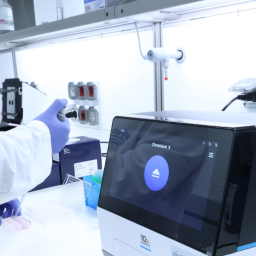
- Mutations in the TP53 tumor suppressor gene occur in 50% of lung adenocarcinoma and associate with a poor prognosis, but how p53 suppresses the development of these tumors remains enigmatic.
- Findings from a study published in Nature (1) show that the TP53 gene governs differentiation of pulmonary alveolar type 1 (AT1) cells, but when mutated it loses its function, resulting in abnormal cell proliferation and the development of lung adenocarcinoma.
- Led by Laura D. Attardi, Professor of Radiation Oncology and of Genetics at the Stanford University School of Medicine, and co-authored by VHIO’s José A. Seoane, this work suggests that differentiation therapy driving correct AT1 cell differentiation could mimic the tumor suppressive function of p53 and open a new therapeutic avenue.
Lung cancer is the second most commonly diagnosed cancer and is the leading cause of cancer death worldwide, with an estimated 1.8 million deaths in 2020 (2). Mutations in the TP53 tumor suppressor gene occur in 50% of lung adenocarcinoma and associate with a poor prognosis.
“However, mechanisms of p53-mediated lung cancer suppression remain a mystery. We sought to establish how p53 restrains the development of lung adenocarcinoma and how these tumor suppression programs might be implicated in governing pulmonary hemeostasis,” says José A. Seoane, Principal Investigator of the Vall d’Hebron Institute of Oncology’s (VHIO) Cancer Computational Biology group and a co-author of this present study (1) led by first author Alyssa Kaiser, Postdoctoral Research Fellow, the Division of Radiation and Cancer Biology at the Stanford University School of Medicine (CA, USA).
Tumor suppressor genes including TP53 are implicated in various biological processes such as cell division, regulation of gene expression, cell-cycle control, and programmed cell death. Alterations and mutations in these genes can cause cells to become malignant and multiply out of control, leading to the development of tumors.
The investigators, led by corresponding author Laura D. Attardi, Professor of Radiation Oncology and of Genetics at the Stanford University School of Medicine, have shed preclinical light on the mechanisms of p53-mediated lung adenocarcinoma, in which p53 governs the differentiation of pulmonary alveolar type 1 (AT1) cells. Their findings, published in Nature (1), also suggest that tumor suppression reflects a fundamental role of p53 in orchestrating tissue repair after cell damage.
p53 as a super-suppressor of lung cancer initiation and progression
In engineered mouse models, the researchers observed that mice with just one or without mutations in p53 had fewer and smaller tumors versus those bearing a total p53 loss. In mice with mutant p53 proteins, findings showed that epigenetic changes were produced by chromatin modification that altered the identity of normal lung cells, driving differentiation into AT1 cells.
“We subsequently analyzed genomic data to evaluate if the same thing observed in mice and cell lines could be seen in human lung tumor samples, mainly in adenocarcinoma, with and without p53 mutations. We confirmed that samples with mutations in p53 also presented gene expression signatures associated with significantly reduced AT1 cell character,” adds Seoane.
Collectively, results of this study illuminate mechanisms of p53-mediated adenocarcinoma suppression, in which p53 governs AT1 differentiation, and suggest that promoting AT1 differentiation may mimic critical functions of p53 and provide a promising new treatment avenue for patients with lung adenocarcinoma.
“Considering the poor outcomes associated with p53 mutation in lung adenocarcinoma, our findings point to the promise of differentiation therapy for this patient population. This strategy is already showing success in the treatment of other tumor types, particularly in acute promyeloid leukemia,” concludes José A. Seoane.
VHIO’s Cancer Computational Biology Group, directed by José A. Seoane, is supported by funding received from the “la Caixa” Foundation.
###
References:
- Kaiser AM, Gatto A, Hanson KJ, Zhao RL, Raj N, Ozawa MG, Seoane JA, Bieging-Rolett KT, Wang M, Li I, Trope WL, Liou DZ, Shrager JB, Plevritis SK, Newman AM, Van Rechem C, Attardi LD. p53 governs an AT1 differentiation programme in lung cancer suppression. Nature. 2023 Jul 19. doi: 10.1038/s41586-023-06253-8. Epub ahead of print.. https://www.nature.com/articles/s41586-023-06253-8.
- Sung H, Ferlay J, Siegel RL, Laversanne M, Soerjomataram I, Jemal A, Bray F. Global Cancer Statistics 2020: GLOBOCAN Estimates of Incidence and Mortality Worldwide for 36 Cancers in 185 Countries. CA Cancer J Clin. 2021 May;71(3):209-249.
























